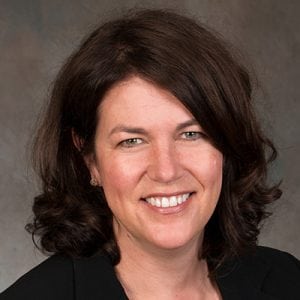
Voice disorders affect approximately 7.5 million people in the United States. Since 2009, the University of Wisconsin Department of Surgery has been deeply involved in training the next generation of researchers who will help to study and treat these disorders. With recently renewed funding from the National Institute on Deafness and Other Communication Disorders, the department will continue to do so for an additional five years, bringing the total length of ongoing federal funding for the UW-Madison Voice Research Training Program to 20 consecutive years.
The UW-Madison Voice Research Training Program is funded by a National Research Service Award Institutional Research Training Grant (T32). T32s are prestigious training grants from the National Institutes of Health that are awarded to academic institutions that demonstrate an exceptional quality of training, mentoring, and success in their graduate programs. This program received its initial round of funding for the five-year period of 2009-2014 under the leadership of Diane Bless, PhD, Professor Emeritus of Otolaryngology-Head and Neck Surgery. The funding was subsequently renewed from 2014-2019. Upon Dr. Bless’ retirement from the program, Susan Thibeault, PhD, CCC-SLP, Professor and Diane M. Bless Endowed Chair in Otolaryngology, assumed the program director position and successfully obtained renewal funding for 2019-2024 and the most recent renewal period of 2024-2029. This most recent renewal also received a score of a one, which is a perfect score.
This funding renewal will grant the program with approximately $2.63 million in funding over the next five years. With this funding, the UW-Madison Voice Research Training program will continue to provide predoctoral and postdoctoral candidates with stipends, tuition and fee support, and funds for training-related travel and other expenses as they pursue research in the field of voice science.
“Having an adequate pool of scientists who are trained on the underlying biological mechanisms of voice disorders and the design and identification of optimal treatments for different causes or conditions is critical to improving patient outcomes,” said Thibeault. “Our Voice T32 provides a unique, multi-disciplinary research training program that fosters the development of basic, translational, and clinical research skills in future leaders in the field of voice science. Since the program launched, we have trained 31 pre- and postdoctoral fellows who have gone on to competitive postdoctoral positions and academic, industry, or government research careers, and we have an additional 6 trainees who are currently funded by the program. We’ve also supported 24 medical students who have engaged in a mentored summer training program for voice research. Our trainees have been incredibly successful, and in no small part this is due to the strength of our program faculty.”
The UW-Madison Voice Research Training program is the only T32 funded by the National Institute for Deafness and Other Communication Disorders at the University of Wisconsin-Madison. Additionally, this is the only T32 in the country that specifically focuses on voice and voice disorders. Trainees in this program receive a breadth and depth of experience to carry out cross-disciplinary research by working with program faculty from across the UW-Madison campus. For this most recent renewal, three new trainers were added to expand the expertise within the program.
“We have 19 program faculty and 4 instructors that include those with MDs and those with PhDs and who represent 7 different departments and 4 schools/colleges across the UW-Madison campus, ranging from the Department of Surgery to Communication and Science Disorders, Biomedical Engineering to Human Oncology, Bacteriology to Chemical and Biological Engineering,” Thibeault explained. “They are well-funded researchers who are experts in their specific fields, with a strong history of publishing their research. Most also have robust history of successfully mentoring pre- and/or postdoctoral trainees. We’re very fortunate to have all of these individuals attached to the program and available to our fellows.”
Since its creation in 2009, the UW Voice Research Training Program has supported 5 predoctoral trainees and 2 postdoctoral trainees each year, along with 2 medical students conducting summer research. During this next five-year period, the program will maintain the current number of predoctoral trainees and medical student trainees, and increase the number of postdoctoral students to 3 per year. Each trainee has an individual learning plan, which includes mentored research, frequent meetings with faculty mentors, attending and presenting in lab meetings and journal clubs, and required and elective coursework. As part of their involvement in the program, trainees are expected to submit abstracts and present their work at national conferences, submit scientific manuscripts to peer-reviewed journals, and submit grant applications for further fellowship funding.
“In leading the UW-Madison Voice Research Training Program, I’m incredibly honored to be carrying on the legacy of outstanding collaborative training, and I’m proud of everything our trainees and faculty have accomplished. By adding to the pipeline of well-trained researchers who are conducting cutting-edge research in voice science, we are not only helping to advance the field forward but are helping to sustain the discipline as a whole,” said Thibeault.